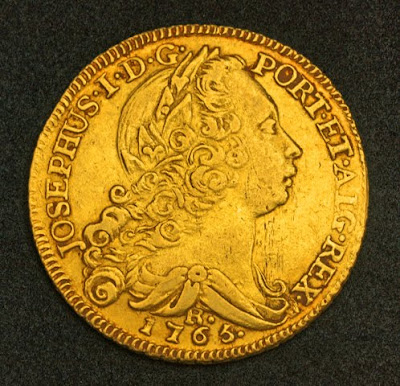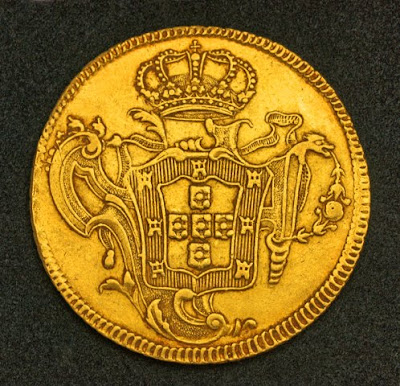 |
| Brazilain 6400 reis gold coins |
 |
| Gold Coins of Brazil 6400 Reis |
Obverse: Wreathed and draped bust of Joseph I right. Date (1765.) and mint initial (R) below.
Legend: JOSEPHUS . I . D . G . PORT . ET . ALG . REX .
Reverse: Crowned coat-of-arms of the Portugueze Empire within foliage.
Reference: Friedberg 65, Gomes-55.01, KM-172.1. R!
Weight: 14.21 gram of Gold (.917) - 0.4229 oz. AGW
Diameter: 31 mm
Peca. A Portuguese gold coin of six thousand and four hundred Reis, or four Escudos, introduced in 1750, and representing a reduced form of the Dobra. It circulated extensively in Brazil and was struck at Rio and Bahia.
Joseph I of Portugal (Portuguese: José I, 6 June 1714 – 24 February 1777), "the Reformer" (Portuguese: "o Reformador"), was the King of Portugal and the Algarves from 31 July 1750 until his death.
He succeeded to the Portuguese throne in 1750, when he was 36 years old, and almost immediately placed effective power in the hands of Sebastião José de Carvalho e Melo, better known today as the Marquis of Pombal. Indeed the history of Joseph's reign is really that of Pombal himself. King Joseph also declared his eldest daughter Maria Francisca as the official heiress of the throne, and proclaimed her Princess of Brazil. By this time, the king did not believe he would have a son.
The powerful Marquis sought to overhaul all aspects of economic, social and colonial policy to make Portugal a more efficient contender with the other great powers of Europe, and thus secure his own power status as a result. A conspiracy of nobles aimed at murdering King Joseph and the Marquis gave Pombal the opportunity (some say, the pretext) to get rid of the Távora family, and to expel the Jesuits in September 1759, thus gaining control of public education and a wealth of church lands and ushering Portugal, which had been a backwater dominated by the High Aristocracy and a very conservative brand of Catholicism, into the Enlightenment age.
The reign of Joseph was also famous for the great Lisbon earthquake of November 1, 1755, in which around 100,000 people died.
The earthquake caused Joseph to develop a severe case of claustrophobia and he was never again comfortable living within a walled building. Consequently, he moved the royal court to an extensive complex of tents in the hills of Ajuda.
The capital was eventually rebuilt at great cost, and an equestrian statue of King Joseph still dominates Lisbon's main plaza.